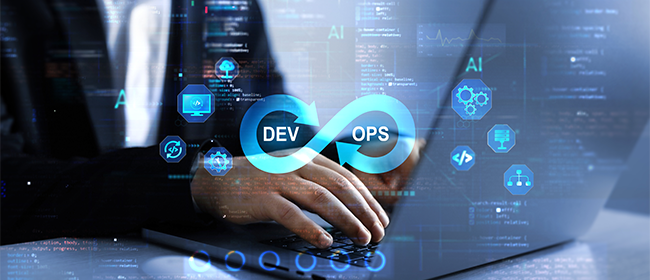Key Takeaways:
- Understand the role of AI in DevOps
- Explore top Generative AI Tools for DevOps Teams
- Know what is in store for the future of AI in DevOps
Integrating AI tools into DevOps has become a game-changer, driving innovation, efficiency, and reliability. AI-powered tools are transforming how DevOps teams operate, from automating complex tasks to enhancing security and streamlining the development process.
This guide explores top generative AI tools for DevOps teams and discusses how they can revolutionize your DevOps pipeline.
Tracing The Role of AI in DevOps
AI in DevOps involves using machine learning (ML) and artificial intelligence (AI) technologies to optimize various aspects of the software development lifecycle. AI tools for DevOps can automate repetitive tasks, analyze large datasets to predict issues before they arise, and continuously monitor systems for potential threats. This integration leads to more efficient workflows, faster deployment times, and higher-quality software products.
Enrolling in a generative AI program opens the window for forward-thinking organizations to explore AI DevOps tools, particularly useful in Continuous Integration/Continuous Deployment (CI/CD) pipelines. This leaves more room for automated testing, code reviewing, and deployment processes. By leveraging AI, DevOps teams can ensure that their software is delivered quickly and meets the highest standards of quality and security.
Top 07 Generative AI Tools for DevOps Teams
For DevOps specialists, it's worthwhile to know the finest generative AI tools transforming businesses. Here’s a closer look.
GitHub Copilot
GitHub Copilot is an AI-powered code completion tool that assists developers in writing code faster and more accurately. Integrated directly into the code editor, Copilot uses machine learning models trained on vast amounts of open-source code to suggest code snippets and even entire functions as you type.
For DevOps teams, Copilot can speed up the development process by automating repetitive coding tasks and providing instant solutions to common coding challenges.
AWS CodeWhisperer
AWS CodeWhisperer is an AI-powered tool designed to assist developers in writing more efficient and secure code. It provides real-time code suggestions, helping users auto-complete lines or entire blocks of code, improving productivity.
CodeWhisperer supports various programming languages and integrates seamlessly with IDEs, ensuring that developers can streamline their workflow, reduce errors, and adhere to best practices. This service is particularly valuable for teams looking to accelerate development while maintaining high-quality standards.
StackRox
Security is paramount in DevOps, and StackRox addresses this by offering AI-driven security solutions for containerized applications. StackRox uses machine learning to detect and respond to security threats in real time, providing DevOps teams with insights into potential vulnerabilities and attacks.
By integrating StackRox into their CI/CD pipeline, DevOps teams can ensure that their applications are secure from development through deployment.
Kubiya
Kubiya is an AI-powered DevOps automation platform that enables teams to define and execute tasks using natural language commands. This tool integrates with popular DevOps tools like Jenkins, GitLab, and Slack, allowing teams to automate complex workflows easily.
Kubiya’s AI capabilities help streamline operations, reduce manual intervention, and improve collaboration across DevOps teams. By simplifying task automation, Kubiya enhances productivity and reduces the risk of human error.
Harness
Harness is a continuous delivery platform that uses AI to automate and optimize the software delivery process. It offers features like automated canary deployments, rollback strategies, and pipeline governance, all powered by AI.
Harness’s AI-driven approach reduces the complexity of managing deployments, ensuring that new releases are delivered quickly and safely. For DevOps teams, Harness is a powerful tool that enhances the speed and reliability of software delivery.
Splunk
Splunk is a data analytics platform that leverages AI and machine learning to analyze logs and metrics across the entire DevOps pipeline. DevOps teams can use Splunk to gain insights into application performance, detect anomalies, and identify trends that could impact the stability of their systems.
Splunk’s AI capabilities enable teams to make data-driven decisions, optimize their operations, and enhance the security of their applications.
Ansible
Ansible is an open-source automation tool that uses AI to streamline the management of applications, infrastructure, and networks. It allows DevOps teams to automate repetitive tasks like configuration management, application deployment, and cloud provisioning. Ansible’s AI-driven playbooks help teams achieve faster deployments, reduce manual intervention, and maintain consistency across their environments.
The Future of AI in DevOps
Integrating AI in DevOps is just beginning, with enormous growth potential. As AI technologies evolve, we can expect even more sophisticated tools to further automate and optimize the DevOps process. AI DevOps tools are becoming essential for teams looking to stay competitive in today’s fast-paced software development landscape.
This is for organizations looking to leverage AI's power in DevOps fully. This is where StackRoute comes into play. StackRoute is a B2B Gen AI training provider specializing in upskilling workforces with the latest AI and machine learning technologies. By partnering with StackRoute, organizations can ensure that their DevOps teams have the knowledge and skills to harness AI-driven tools' full potential.
Frequently Asked Questions!
1. How can an organization use generative AI in DevOps?


2. How do AI tools contribute to automation in DevOps?


3. How do AI-driven testing tools differ from traditional testing tools in DevOps?


4. What role does predictive analytics play in AI tools for DevOps?


5. Can AI replace DevOps?








